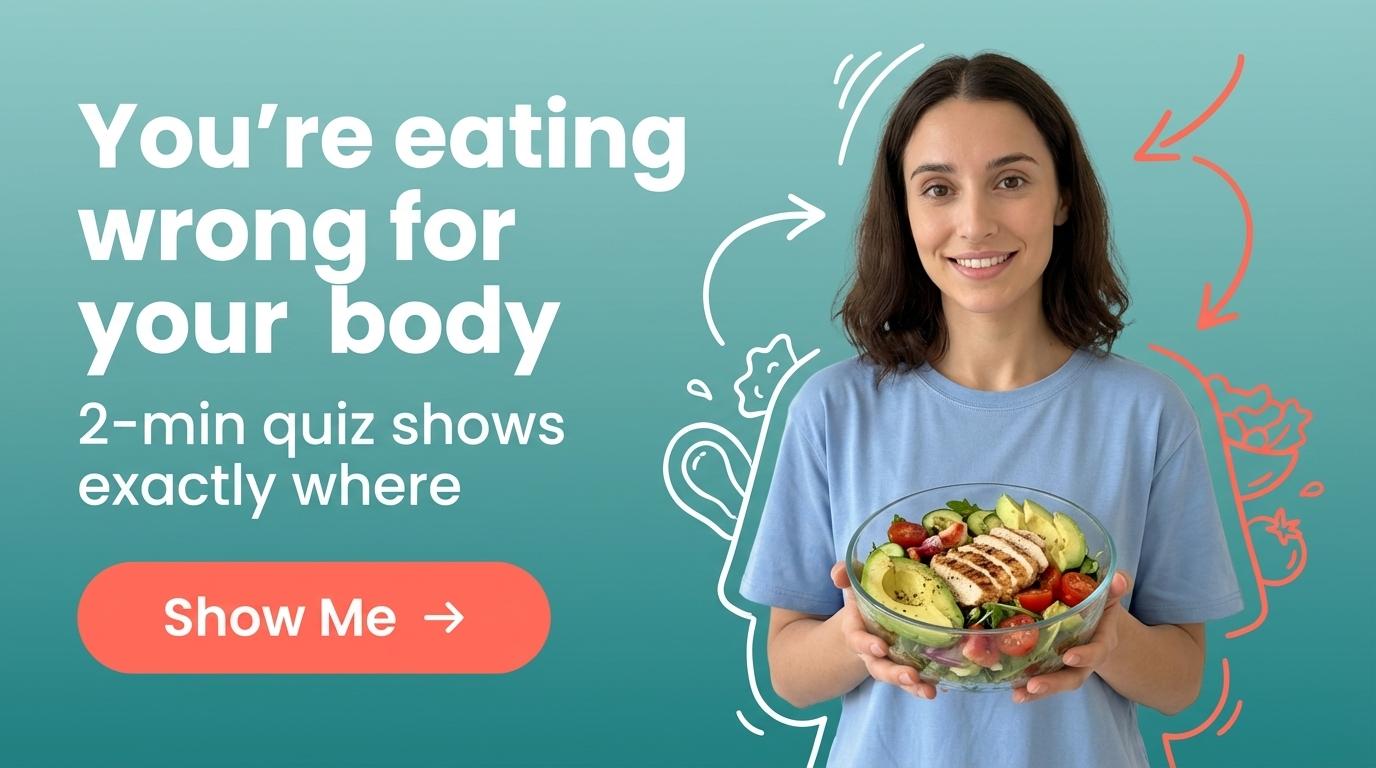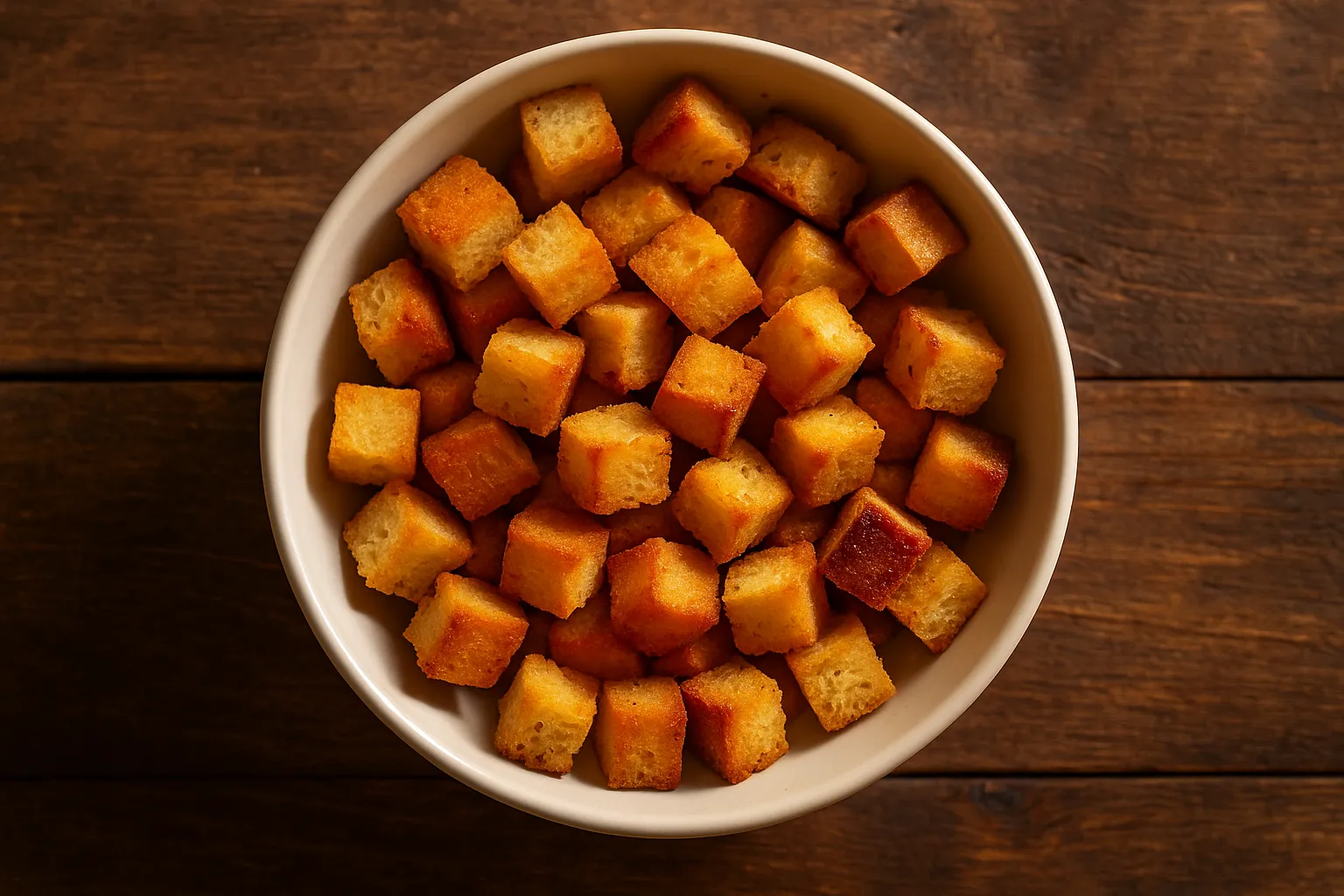Croutons: Calories, Nutrition and Health Benefits
Crispy bread cubes that add crunch and flavor to salads, soups, and more. Choose whole wheat for fiber and nutritional value.
Quick Nutrition Facts
Per 1 Cup Croutons (30g)
| Nutrient | Amount |
|---|---|
| Calories | 122 kcal |
| Protein | 3g |
| Carbohydrates | 20g |
| Fiber | 1g |
| Sugars | 0.5g |
| Fat | 4g |
| Sodium | 250mg |
| Iron | 1.2mg |
| Calcium | 60mg |
| B Vitamins | 0.1mg |
Macronutrient Breakdown

NUTRITIONIST INSIGHT
Croutons transform plain salads into satisfying meals. Whole wheat versions provide 2-3g fiber per serving, supporting digestion. Use 2 tablespoons per salad to control calories while maintaining crunch and appeal.
Myth Busters
MYTH #1: Croutons Are Bad for Weight Loss
TRUTH: A 30g serving (1 cup) contains only 122 calories. When used as a salad topper in moderation (1-2 tablespoons), they add crunch without sabotaging weight goals. The key is portion control, not avoidance.
MYTH #2: All Croutons Are High in Sodium
TRUTH: While store-bought versions average 250mg sodium per 30g serving, homemade croutons can contain 50-100mg depending on seasoning. Make your own by cubing whole wheat bread, tossing lightly with olive oil, and baking.
MYTH #3: Croutons Add Empty Calories
TRUTH: Croutons from whole wheat bread provide B vitamins for metabolism, carbohydrates for sustained energy, and iron. The "empty calorie" label applies only to refined white-bread versions without nutritional value.
MYTH #4: Croutons Contain Excess Oil
TRUTH: Commercial croutons typically contain 4g fat per 30g serving—equivalent to 1 teaspoon of oil. Homemade croutons use even less when tossed minimally with olive oil, herb seasoning, and baking instead of deep-frying.
MYTH #5: Croutons Don't Contribute to Satiety
TRUTH: Whole wheat croutons provide 2-3g fiber per serving, promoting fullness. The crunch factor also encourages slower eating and greater meal satisfaction compared to soft-textured salad bases alone.
NutriScore by Health Goals
| Health Goal | NutriScore | Why This Score? |
|---|---|---|
| Weight Loss |  | 122 calories per serving; whole wheat adds 2g fiber for satiety. Use 1-2 tablespoons per salad. |
| Muscle Gain |  | 3g protein per 30g; combine with protein sources (chicken, tofu, legumes) for complete meal. |
| Diabetes Management |  | 20g carbs per serving; choose whole wheat varieties with higher fiber (2-3g). Monitor portion size. |
| PCOS Management |  | Refined carbs can spike blood sugar. Use sparingly with fiber-rich vegetables and protein for balanced meals. |
| Pregnancy Nutrition |  | Provides folate-rich whole wheat option; 3g protein supports fetal development. Use as salad topping in moderation. |
| Viral/Flu Recovery |  | Easy to digest; B vitamins from bread support energy recovery; add to light soups for nourishing comfort meals. |
PERSONALIZED NUTRITION
Track your meals with NutriScan for personalized NutriScores based on your specific health goals!
Blood Sugar Response to Croutons
Understanding how bread-based croutons affect your blood glucose helps you pair them wisely with salad components.
Typical Glucose Response Curve
*This chart shows typical blood glucose response for general healthy individuals. Individual responses may vary. Not medical advice.*
How to Flatten the Spike
Pairing croutons wisely minimizes blood sugar impact:
- 🥗 Salad base with leafy greens - Adds fiber and volume; slows digestion
- 🍗 Protein source (chicken, tofu, legumes) - Protein slows carb absorption
- 🥑 Healthy fat (olive oil dressing, avocado, nuts) - Extends satiety and moderates glucose rise
- 🌿 Vinegar-based dressing - Acetic acid may reduce glycemic impact
This approach transforms croutons from a simple carb into part of a balanced, blood-sugar-friendly meal.
Cultural Significance
Croutons evolved from French cuisine, where leftover bread was salvaged by cutting, seasoning, and toasting. The practice reflects traditional food economy and resourcefulness.
Historical Context:
- Originally a way to reduce bread waste in 18th-century French kitchens
- Named from the French word "croûte" (crust)
- Became standard salad topper in Niçoise, Caesar, and garden salads across Europe and North America
Modern Usage:
- Popular worldwide in soups, salads, and as standalone snacks
- Homemade versions gaining popularity for health-conscious cooking
- Whole grain varieties align with modern nutrition trends emphasizing fiber and whole foods
Compare & Substitute
Croutons vs Similar Salad Toppings (Per 30g)
| Nutrient | 🍞 Croutons (White) | 🌾 Croutons (Whole Wheat) | 🥜 Croutons (Herbed) | 🌰 Nuts (Mixed) |
|---|---|---|---|---|
| Calories | 122 kcal | 110 kcal | 125 kcal | 170 kcal |
| Carbs | 20g | 18g | 19g | 6g |
| Fiber | 1g | 2.5g | 1g | 3.5g |
| Protein | 3g | 4g | 3.5g | 6g |
| Fat | 4g | 3.5g | 4.5g | 15g |
| Sodium | 250mg | 100mg | 280mg | 5mg |
| Best For | Salads, soups | Weight loss, fiber boost | Flavor emphasis | Protein & healthy fats |
Frequently Asked Questions
Are croutons good for weight loss?
Yes, croutons can support weight loss in moderation. A 30g serving contains 122 calories. Use 1-2 tablespoons per salad to add crunch without excess calories. Whole wheat versions provide 2g fiber for satiety.
How much protein is in croutons?
A 30g serving contains 3g protein. While modest, it contributes to overall meal protein when combined with salad proteins like grilled chicken, tofu, or legumes. Not a primary protein source but a helpful addition.
Are croutons made from whole wheat?
Most commercial croutons use white bread (1g fiber). Seek whole wheat varieties offering 2-3g fiber per serving. Homemade croutons from whole grain bread provide superior fiber and micronutrient content at lower cost.
What are the health benefits of croutons?
Croutons provide carbohydrates for energy, B vitamins for metabolism, and textural appeal encouraging vegetable consumption. Whole wheat versions add fiber for digestion; when paired with protein and fat, they create balanced, satisfying meals.
Can I make homemade croutons?
Absolutely. Cube whole wheat bread, toss lightly with 1 teaspoon olive oil per 2 cups, season with garlic powder, herbs, and salt. Bake at 375°F for 10 minutes until golden. This method controls oil, salt, and freshness.
How do I store croutons?
Keep store-bought croutons in an airtight container at room temperature for 1-2 weeks. Homemade croutons stay crisp 3-5 days when stored similarly. For longer storage, freeze in a sealed bag for up to 2 months; toast briefly before serving.
 ChatGPT
ChatGPT  Claude
Claude  AI Mode
AI Mode  Perplexity
Perplexity 



